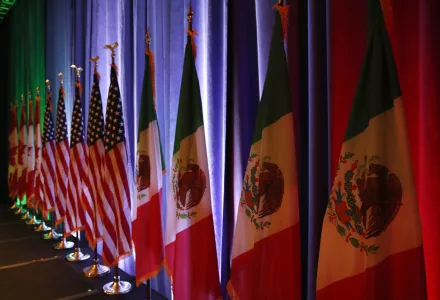
The law gives legislators the authority to hold onto Nafta as it is or vote for a new deal.
Congress should reassert its constitutional authority over trade. To start, lawmakers should insist on their prerogative to decide whether to retain the North American Free Trade Agreement or adopt President Trump’s proposed replacement.
Congress passed Nafta in 1993 after a major debate and enacted legislation to implement it. Members should remind the president that the executive’s role does not extend to overriding Congress’s votes and statutes. Article I of the Constitution grants Congress the authority “to regulate Commerce with foreign Nations” and “to lay and collect Taxes, Duties, Imposts and Excises.” Congressional conservatives concerned about the overreach of the administrative state should not permit the executive to bypass Congress’s own determinations. Congress has authority to hold on to Nafta or vote for a new deal.
The first question for lawmakers is which countries should be in a new agreement. As Sen. Patrick Toomey and others have pointed out, Congress authorized negotiation of a pact with Mexico and Canada, not only Mexico. The original idea behind Nafta, which Congress endorsed, was to create a free North American market that would help all three countries compete with Asia and Europe. That worked. Dropping Canada, the largest U.S. market for exports, is no mere technicality.
Congress also needs to scrutinize carefully the administration’s new terms, which are sketchy. There appears to be some useful modernization of rules, drawn from provisions of the Trans-Pacific Partnership (which the president abandoned). But other administration priorities will thwart trade and investment.
The heart of the new deal is a government dictate for auto supply chains, inputs and wages that would impede imports, raise prices, and make North America’s auto industries less competitive globally. Congress needs to investigate reports of a side letter with Mexico that would set a quota for car imports with an unspecified tariff for cars above that limit. The administration appears to want to retain its national-security justification for raising tariffs, which it has used against Mexican and Canadian steel and aluminum and has threatened to apply to autos.
Congress should insist that Mr. Trump stand by his own deal. Mexico and Canada are America’s partners, not national-security threats. There is no national-security justification for blocking Mexican or Canadian steel, aluminum or autos. If the administration will not agree, Congress could use the implementing legislation for the agreement to exempt Mexico and Canada from Section 232 tariffs.
The administration’s auto pact sets an international minimum wage of $16 an hour for workers who produce 40% to 45% of each car’s value. That would set a major precedent. Congress will need to decide whether trade agreements should set wage rates for autos and other sectors and, if so, at what levels. Flexible U.S. wages give America’s producers an advantage. Other countries, for example in Europe, may demand higher U.S. wages to produce goods they buy.
The new deal would weaken the rights of U.S. investors in Mexico. Instead of preserving the principle of equal protection under the law, the administration retains protections for investors in three industries, but abandons almost all safeguards for everyone else. The new policy would remove assurances for U.S. investors who may wish to bring profits home, a reversal that conflicts with Congress’s 2017 tax overhaul. The removal of investor protections is especially ironic given the administration’s complaints about China’s unfair requirements for investors. Nafta’s current rules check that type of discriminatory behavior by incorporating U.S. constitutional principles of protection against “takings” of private property. Under these rules, the U.S. has never lost a case in any international investment tribunal.
The terms with Mexico would eliminate another dispute-resolution process, which sought speedy justice—another American principle—in cases of dumping and unfair subsidies. Canada is fighting hard to keep this system. Congress should want to know why the Trump administration is unwilling to defend cases about unfair practices under the terms of its deal. Other administrations have believed that the U.S. competes most successfully through the fair application of the rule of law.
Congress needs greater clarity on the expiration date of the “new Nafta,” too. Nafta is a long-term commitment, based on legal rules, that gives the private sector—businesses, farmers and ranchers, investors, workers and civil society—confidence to build new linkages across the continent. Unlike the European Union’s idea of “shared sovereignty,” the U.S., Mexico and Canada each prize their national independence and sovereignty. The North Americans developed a new, mutually beneficial model of economic integration based on closer private-sector ties, an expanding recognition of common interests, and respect. That commitment should not have an expiration date.
Past Congresses have championed their prerogatives assertively. If today’s Congress is hesitant, it should keep an eye on public opinion. A recent poll by the Chicago Council of Global Affairs reveals that 82% of Americans say trade is good for the economy, 85% believe trade is good for consumers, and 67% think trade is good for creating U.S. jobs. Support for Nafta is now at 63%. The president’s deal-making has been long on self-congratulation and short on substance. Congress needs to step up.
Zoellick, Robert. “Congress, Don’t Let Trump Usurp Your Power Over Trade.” The Wall Street Journal, September 3, 2018




